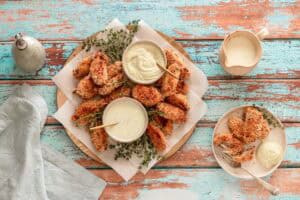To maintain a healthy weight and a healthy life, try to eat meals that have a mix of fat, carbohydrates, and protein.

Maintaining a healthy weight is all about balancing the calories you eat with the calories your body uses. The most important ways to help keep the balance is by eating a variety of foods and exercising regularly.
Eat variety of foods
Choose meals that include three to five of the food groups and snacks that include two to three of the food groups.
Fruits, vegetables, whole grains, lean proteins and low-fat or fat-free dairy all contribute to a healthy and balanced diet.
Have fun with your meals and explore the wide variety of foods within each of these groups.

Carbohydrates, proteins and fat
These are all sources of energy and each has an important role in the body.
Fad diets that greatly limit one of these nutrients, such as low carbohydrate diets, don’t tend to help people keep a healthy weight in the long run.
Rather than trying to eat a very small or large amount of any one nutrient, focus on eating a healthy balance of fat, protein and carbohydrates.
To achieve a healthy balance aim for these percentages of your total calories:
Fat – 25-35%.
Protein – 10-35%.
Carbohydrate – 45-65%
ALSO READ: How to relax without alcohol

Exercise regularly
Regular physical activity is key to a healthy lifestyle when you balance what you eat and drink to maintain a healthy weight. Easy, fun ways to get active include:
- Brisk walking
- Jogging
- Dancing
- Cycling
- Skating
- Hiking
- Gardening
Benefits of exercise
- Keeps your mind sharp
- Helps you feel better
- Helps to maintain weight
- Lowers your risk of a variety of diseases.
Food portions
Portion control is essential to balancing your calories with physical activity in order to maintain a healthy weight.
Try these tips to reduce your portion sizes:
- Use smaller plates, bowls, and cups
- Buy whole fruit or pack single servings of healthy options to eat as snacks
- Put a single serving of a snack in a bowl rather than eating from the box or bag.
Don’t overeat
Overeating often comes with distracted or rushed eating. Use these tips to help make healthy choices and stop yourself from overeating:
- Do not eat while watching television or in the car
- Sit down at the table while eating
- Eat slowly and take time to enjoy your meal
- Eat when you are hungry, and stop when you are satisfied
- Enjoy meals with family, friends or co-workers.

Eat regular meals
Eating regular meals will help you to make healthy choices when it comes to food and portion size.
Missing meals or going for long periods without food can lead to overeating and spur of-the-moment unhealthy food choices. Listen to your body and eat when you are hungry.
Limit empty calories
Empty calories come from foods that have few vitamins and minerals but lots of calories from added sugar or fat.
Foods with empty calories, like sweets and snack foods, make it hard to get enough vitamins and minerals without eating too many calories.
Good alternatives include whole-grain crackers and breads, fruits and vegetables, lean meats like poultry and fish, and low-fat or fat-free dairy foods.

Be smart about beverages
- Choose water to stay hydrated, avoid added calories and save money
- Include nutrient-dense fat free or low-fat milk and small amounts of 100% juice
- Avoid soft drinks, fruit drinks and sports or energy drinks that have lots of calories with few vitamins and minerals
- Try coffee or tea with little or no added sugar or cream for another healthy alternative.
It’s an art to learn the balance between food and physical activity but once you get it right, it truly simplifies your life.
NOW READ: Benefits and risks of hot yoga






